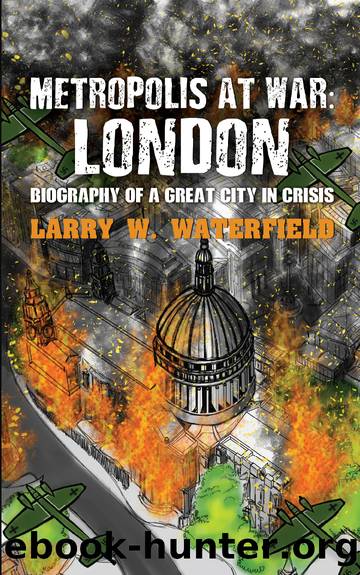Metropolis at War: London by Larry W. Waterfield

Author:Larry W. Waterfield [Waterfield, Larry W.]
Language: eng
Format: epub
ISBN: 9781641821452
Google: N41vwgEACAAJ
Publisher: Austin Macauley Publishers LLC
Published: 2019-02-27T16:04:49+00:00
The great rival was the Daily Mirror, with 1.4 million daily copies sold. The Mirror, with its press baron owner Lord Rothermere had close ties to the Labor Party. Other âpopularâ papers included the Daily Sketch, a tabloid, and the Evening Standard, which would play a role in pushing Britain and Germany toward war. (More on that later.)
On a higher level were the so-called âquality papersâ, with their long and erudite features and commentaries, lengthy obituaries, and influential Letters to the Editors. Among these were the Telegraph, with its appeal to the establishment Conservatives; and the Times of London, âthe Good Grey Ladyâ, the newspaper of record, and probably the countryâs best known newspaper.
Scattered among the lanes, alleys and squares around Fleet Street were dozens of magazines, illustrated weeklies, and specialized publications of all kinds, including humor magazines such as Punch. The illustrated publications, with their photos, illustrations, and artwork covered the great events of a world capital, state visits, Royal occasions, military pageantry, investitures, famous horse races and sporting events, and the comings and goings of celebrities. They chronicled the pomp, circumstance and color of what then was a vast empire. The best known of these, The Illustrated London News, invented the genre. Its editor, Bruce Ingram, was the senior editor on Fleet Street, and had been on the job for decades. ILN controlled a stable of other publications, including the Graphic and the Tatler.
The top editors wielded real power. At the top of that list was Geoffrey Dawson of The Times. Dawson was a friend of the powerful, particularly Prime Minister Neville Chamberlain, in power at the outbreak of the war, and Lord Halifax, the foreign secretary. Dawson favored a conciliatory stance toward Hitler, a so-called appeasement policy. Both Chamberlain and Halifax famously followed the appeasement route, and were greatly discredited for it. As editor of the nationâs most influential newspaper, Dawson encouraged and backed the appeasers. Dawson was also opposed to the creation of a Jewish homeland in Palestine.
Download
This site does not store any files on its server. We only index and link to content provided by other sites. Please contact the content providers to delete copyright contents if any and email us, we'll remove relevant links or contents immediately.
Room 212 by Kate Stewart(5107)
The Crown by Robert Lacey(4812)
Endurance: Shackleton's Incredible Voyage by Alfred Lansing(4774)
The Iron Duke by The Iron Duke(4352)
The Rape of Nanking by Iris Chang(4209)
Joan of Arc by Mary Gordon(4106)
Killing England by Bill O'Reilly(4000)
Say Nothing by Patrick Radden Keefe(3977)
I'll Give You the Sun by Jandy Nelson(3432)
Shadow of Night by Deborah Harkness(3362)
Hitler's Monsters by Eric Kurlander(3334)
Mary, Queen of Scots, and the Murder of Lord Darnley by Alison Weir(3209)
Blood and Sand by Alex Von Tunzelmann(3201)
Eleanor & Park by Rainbow Rowell(3158)
Darkest Hour by Anthony McCarten(3124)
Margaret Thatcher: The Autobiography by Thatcher Margaret(3081)
Book of Life by Deborah Harkness(2936)
Red Famine: Stalin's War on Ukraine by Anne Applebaum(2930)
The One Memory of Flora Banks by Emily Barr(2860)
